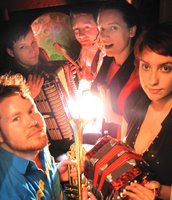
As drunken hordes flooded downtown Athens late Saturday night in the aftermath of the Georgia-Tennessee game, an entirely different Southern tradition unfolded within the walls of the 40 Watt Club.
First, local folk group Hope For Agoldensummer treated a few dozen die-hards to a brisk but relaxing set filled with haunted tales of love and faith. With its unique sense of instrumentation (or sometimes, lack thereof), the friendly quintet traded guitars, xylophones and accordions among its members almost as often as it traded words with the sparse but nonetheless enthused crowd.
Sisters Claire and Page Campbell used their angelic vocals merely as another instrument on old staples like “Love Letter” and “Love Like A Sailor,” blending seamlessly with Will Taylor’s thumping violoncello, Deb Davis’ minimalist guitar work and Jamie Shepard’s restrained drumming.
On crowd favorite “Time Will Tell,” though, the Campbells’ supporting cast rested and let the sisters’ pipes take center stage. Claire and Page belted out a soulful tune about unrequited love as they played a children’s hand-clapping game—the song’s only soundtrack.
Perhaps the trademark of Hope for Agoldensummer is its clever transformation of seemingly mundane household objects into eerily gorgeous instruments, and nowhere was that more evident than on “Hearts In Jars.” Partway through the song, Shepard picked up a wooden crate full of empty glass bottles and swayed to the plodding beat, creating an odd but decidedly pleasing sound not unlike a muffled high-hat. Claire also put the singing saw to work on several tracks, using a violin bow against the metal to elicit a ghostly high-pitched whine.
After a dozen songs, the Campbells and company gathered their equipment and left the stage to make room for Packway Handle Band. With only a pair of 40s style radio mics set up front and center, the local bluegrass group rushed onstage with instruments in hand, and then the real show began.
Clad in three-piece suits of various earthy tones, the men of Packway Handle Band played with such fervor and sang with such energy as to reinvigorate a fading crowd. A handful of fans from the football game arrived drunk and disheveled but showed new life once the tunes began, led by a girl in red cowboy boots who didn’t stop dancing for the duration of Packway’s exhaustive two-hour set.
The group’s selection included an odd mixture of traditional bluegrass staples—including a flawless rendition of “Keep on the Sunny Side”—and zany originals, most notably “Satan’s In Space” and “(Sinner) You Better Get Ready.”
The band also managed to effortlessly transform Leonard Cohen’s “Diamonds In the Mine,” Bob Dylan’s “Don’t Think Twice, It’s Alright” and Joe Cocker’s “Never Tear Us Apart” into bluegrass masterpieces, so much so that it was nearly impossible to tell which songs were modern covers, which were originals and which were timeless bluegrass staples.
As the clock neared 2 a.m., the rest of Athens had long since drowned its sorrows and headed home to sleep away its disappointment, but Packway Handle Band seemed not to care. Within the 40 Watt, time s
tood still as the group evoked the spirit of an old-time camp meeting reviving those who had fallen astray.
For fans crushed by the Bulldogs’ defeat, Packway Handle Band’s edgy brand of bluegrass seemed like much-needed therapy after a night of repeated let-downs. For those more interested in the music, however, it was a revival of sorts, as Packway Handle Band reminded everyone that bluegrass in Athens is not just alive and well—it’s rocking with the best of them.
—Matthew Grayson













 As drunken hordes flooded downtown Athens late Saturday night in the aftermath of the Georgia-Tennessee game, an entirely different Southern tradition unfolded within the walls of the 40 Watt Club.
As drunken hordes flooded downtown Athens late Saturday night in the aftermath of the Georgia-Tennessee game, an entirely different Southern tradition unfolded within the walls of the 40 Watt Club.
